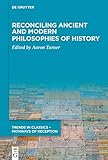Reconciling Ancient and Modern Philosophies of History / ed. by Aaron Turner.
Material type: TextSeries: Trends in Classics – Pathways of Reception ; 3Publisher: Berlin ; Boston : De Gruyter, [2020]Copyright date: ©2020Description: 1 online resource (VI, 372 p.)Content type:
TextSeries: Trends in Classics – Pathways of Reception ; 3Publisher: Berlin ; Boston : De Gruyter, [2020]Copyright date: ©2020Description: 1 online resource (VI, 372 p.)Content type: - 9783110627107
- 9783110627466
- 9783110627305
- D16.9 .R425 2020
- online - DeGruyter
- Issued also in print.
| Item type | Current library | Call number | URL | Status | Notes | Barcode | |
|---|---|---|---|---|---|---|---|
 eBook
eBook
|
Biblioteca "Angelicum" Pont. Univ. S.Tommaso d'Aquino Nuvola online | online - DeGruyter (Browse shelf(Opens below)) | Online access | Not for loan (Accesso limitato) | Accesso per gli utenti autorizzati / Access for authorized users | (dgr)9783110627305 |
Browsing Biblioteca "Angelicum" Pont. Univ. S.Tommaso d'Aquino shelves, Shelving location: Nuvola online Close shelf browser (Hides shelf browser)

|

|

|

|

|

|

|
||
| online - DeGruyter Palais de Tokyo : Kunstpolitik und Ästhetik im 20. und 21. Jahrhundert / | online - DeGruyter The Expression of Temporal Meaning in Caboverdean / | online - DeGruyter The Saga of the Jómsvikings : A Translation with Full Introduction. | online - DeGruyter Reconciling Ancient and Modern Philosophies of History / | online - DeGruyter Ontology: Laying the Foundations / | online - DeGruyter Philosophy of Music : A History / | online - DeGruyter Freiwilligenarbeit und gemeinnützige Organisationen im Wandel : Neue Perspektiven auf das 19. und 20. Jahrhundert / |
Frontmatter -- Contents -- Introduction: Reconciling Ancient and Modern Philosophies of History -- Part I: Awakening Ancient Historical Consciousness -- The Territory of the Historian in Antiquity -- Just Forces: Heidegger, Arendt and Antiquity -- On not Being Modern: Exploring Historical Ontology with Bruno Latour -- Truth, Method and the Historian’s Character: The Epistemic Virtues of Greek and Roman Historians -- The Universal in the Particular: A Core Dilemma of Historicism in Antiquity -- Part II: Transcending Representation and Reality -- Teleology with a Human Face: ‘Sideshadowing’ and its Effects in Tacitus’ Treatment of Germanicus (Annals 1–2) -- Minding the Gap: Mimetic Imperfection and the Historiographical Enterprise -- The Life of the Biographer: Plutarch’s Presence in Sulla, Antony and Otho -- Demos, Democracy and Method: Political Trust and the Science of Suspicion -- Part III: Antiquating Modernity -- Walter Benjamin and Greek Historiography -- When Augustus met Adorno: Class, Mimesis and Restoring the Past -- Teleology and the Experience of History -- The Limits of Progress and the Modern Problem of Historical Meaning -- Thucydides and the Historiography of the Future -- List of Contributors -- Index
restricted access online access with authorization star
http://purl.org/coar/access_right/c_16ec
The distinction between ancient and modern modes of historical thought is characterized by the growing complexity of the discipline of history in modernity. Consequently, the epistemological and methodological standard of ancient historiography is typically held as inferior against the modern ideal. This book serves to address this apparent deficit. Its scope is three-fold. Firstly, it aims at encountering ancient modes of historical and historiographical thought within the province of their own horizon. Secondly, this book considers the possibility of a dialogue between ancient and modern philosophies of history concerning the influence of ancient historical thought on the development of modern philosophy of history and the utility of modern philosophy of history in the interpretation of ancient historiography. Thirdly, this book explores the continuities and discontinuities in historical method and thought from antiquity to modernity. Ultimately, this volume demonstrates the necessity of re-evaluating our assumptions about the relation of ancient and modern historical thought and lays the groundwork for a more fruitful dialogue in the future.
Issued also in print.
Mode of access: Internet via World Wide Web.
In English.
Description based on online resource; title from PDF title page (publisher's Web site, viewed 28. Feb 2023)


